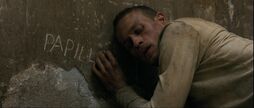Before the start of the feature film, the "adaptation based on real events" emphasizes the authenticity of the story. The real story is easier to bring the audience into the story, and observe the series of conflicts surrounding the protagonist from the perspective of God, and the cause and effect caused by it.
The story begins in Paris in the 1940s, with Hunnam as Papillon (French: butterfly), a thief who steals for the gang. After a successful burglary, he came to a nightclub under the jurisdiction of the gang to turn in the stolen goods. He happened to encounter the gang dealing with a traitor, and the gang boss explained that the dying traitor was taken away. After dealing with the loot, Papillon takes his lover Nennete (played by Hewson) to a rave.
The next day, Papillon and his lover woke up in the rental house. After the two flirted with each other, the landlord knocked on the door to urge the rent. Papillon opens the door and police arrest Papillon on suspicion of murder. It was the traitor who was dealt with yesterday, a pimp who was murdered. The slandered Papillon met his lover for the last time, because the lover was a prostitute, and even if she provided witness that Papillon was with her all night, the judge would not believe it. As a result, Papillon was sentenced to life and sent to the "Devil's Island" prison in French Guiana for hard labor along with the other suspects.
On his way to prison, Papillon meets Marek's Degas, a scrawny millionaire who is jailed for forging bonds. His wife promised him that he would appeal to a judge and rescue Degas before Christmas. The fellow prisoners took the emaciated Degas and tried to take the money from her. Papillon took a fancy to this, in exchange for money in exchange for protecting Degas.
Papillon, who was serving his sentence in prison, secretly planned an escape plan. The prisoner Celier played by Moeller was once a sailor. He could get a boat with money. The three planned to find an opportunity to escape from the prison and then escape from the sea by boat. While the three were doing hard labor, Papillon made a deal with a hitchhiker (rail car) coachman who would take them from the prison to the ship that Celier contacted. As soon as the camera turned, the arrested prisoner was executed in public in the prison square for killing the prison guard. The warden explained that Babylon and Degas carried the corpse away. On the way, Degas could not bear the corpse and fell on the side of the road. The prison guard slapped Degas with the whip, but because he couldn't bear Degas being whipped, Papillon lifted a stone and smashed it at the guard. The other prison guards who came chased after Babylon, who jumped into the river to avoid the pursuit. At night, Papillon, who had successfully escaped, came to the camp of the coachman. The coachman betrayed Papillon and handed it over to prison. Prison regulations: Those who attempt to escape for the first time will be held in solitary confinement for two years, during which time they are not allowed to speak and remain silent; those who have attempted to escape for the second time will be held in solitary confinement for five years; those who have murdered will be executed. During the confinement period, Papillon had only bland soup. Degas bribed the prison guards and smuggled half a coconut to Papillon on a regular basis. Other prison guards found out about this, and the warden asked Papillon who had bribed the prisoner, but Papillon did not explain. Since then, Papillon meals have been halved. After some time, the warden asked the scrawny Papillon again, but he still did not answer. The warden punished him for spending the remainder of his confinement in the dark.
Two years later, the dying Babylon was transferred to the prison ward, and Degas had now become the warden's assistant, handling documents. Degas came to visit Babylon for the first time. Looking at Babylon who put himself in danger for himself, Degas felt very guilty and expressed his deep-seated apology. The friendship between the two was sublimated. Degas told Papillon that Degas's wife did not rescue him and remarried a lawyer. Frustrated Degas did not give up, this week the prison will be showing a movie, which is a once-in-a-lifetime escape. The two recruited their former partner, Celier, to plan an escape together again, and recruit Maturette to join them. The 4 managed to escape in the chaos. When they jumped off the fence, Degas accidentally broke his leg. The 4 struggled to reach the junction. The 4 used Degas' savings to buy a sloop. Along the river, the boat successfully entered the sea. Because of the excessive load, the small boat, which was already leaking, sailed with difficulty at sea. The house leaked during the night rain, and the boat encountered a storm. Celier insisted on killing Degas in order to protect himself. In the face of danger, Papillon stepped forward again. Papillon lost to Celier. At the moment of crisis, Degas picked up the knife and stabbed Celier fiercely. After dropping Celier's body, the three fought desperately to keep the boat from sinking into the sea during the storm.
As soon as the camera turns, Papillon wakes up in the house, surrounded by several indigenous people. Papillon got up to look for Degas, and at this time met a nun who told Papillon that this was Colombia and that she knew their identities. After Papillon found Degas, he warned him that the nuns knew their identities. Whether Degas wants to come or not, he will continue to run away, and Degas shows that he does not want to run away. After the two said goodbye, Papillon was on the run and saw that the prison guards were looking for them. In order to prevent Degas from being arrested, Papillon gave up the opportunity to escape and returned to Degas. Maturette is killed, and Papillon and Degas are taken back to prison. Papillon was sentenced to 5 years of confinement, and Degas was directly exiled to "Alcatraz", an isolated sea island surrounded by sea. After the 5-year confinement was over, the warden came to see Babylon in person, because very few people could survive the 5-year confinement, and Babylon was also taken to Alcatraz.
On Alcatraz, Degas and Babylon meet again. The ragged and unkempt Degas fell into silence in the face of Babylon, who had been unable to speak for five years, surrounded by desperate cries and mad prisoners. Degas took Babylon to the residence, and the two faced this desperate situation, leaving only each other's company.
However, Papillon did not give up. He went to the seaside to observe the waves and found that the waves followed the direction of the mainland. Papillon, who decided to fight his fate to the end, showed Degas the idea of fleeing from the sea. In order to support Papillon's escape, Degas helped to make a raft together, and put paper rolls of hand-painted butterflies into bottles and coconut shells together. Degas finally chose to stay and bid farewell to Papillon on the edge of the cliff. Papillon pushed down the raft, and the raft successfully floated at sea. Facing the unknown, Papillon jumped into the sea. Degas looked at the disappearing figure in the sea, did not dare to look at it, and closed his eyes. At this moment, faint shouts came from under the cliff. Babylon shouted Degas' name, and the two shouted in ecstasy.
The raft carried Papillon on the sea, and when the camera turned, Papillon, who was already an old man, survived successfully. He turned his story into a memoir and handed it over to a French publisher, and the film ends with a scene of a butterfly manuscript hand-painted by Degas.
As a main plot movie, the ending is that the protagonist, Papillon, has gone through hardships and finally broke into a butterfly and regained his freedom. When the audience sees this, they can breathe a sigh of relief and admire Papillon's tenacious belief and eternal yearning for freedom. But I believe everyone will have doubts why Degas did not choose to flee with Babylon. Some argue that Degas was tired of running away, and that his wife's betrayal led to his disillusionment with the ideal society. As a constant companion and supporter of the protagonist, he still has a longing for freedom, but he finally chose to end the rest of his life in Alcatraz. I think he did this because he, who killed Celier, faced himself and couldn't forgive himself for the sin he had committed. This can be seen from the paintings on the walls and roof of his residence, where the bright red color represents the bloody sins committed. Therefore, in the face of the ultimate judgment of good and evil in human nature, he chose to stay in Alcatraz to atone for his sins.
View more about Papillon reviews










